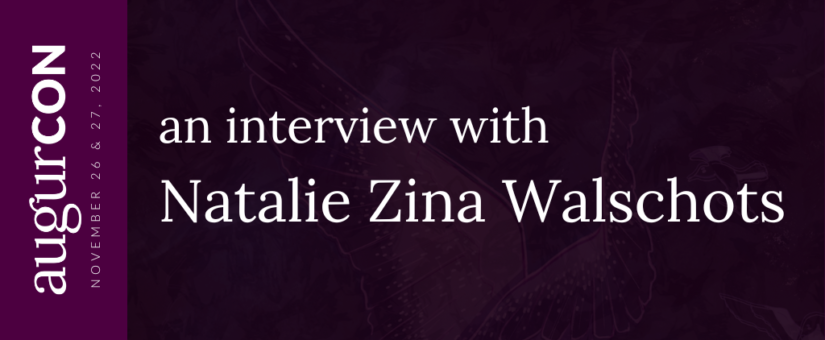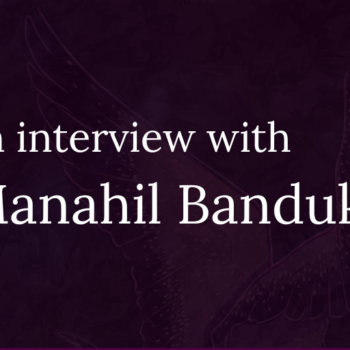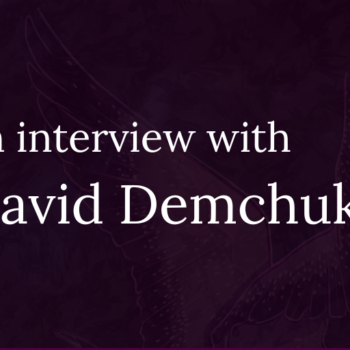
An interview with Natalie Zina Walschots #Augurcon2022
- Posted by Augur Blog
- On November 17, 2022
- 0 Comments
- author interview
On November 26 & 27 we’re hosting our second-ever AugurCon, our virtual celebration of speculative literatures! We’re joined by over 45 amazing guests, including authors, poets, editors, and publishing professionals, to explore the intersections of the world we know—and the ones we dare to imagine.
We connected with Natalie Zina Walschots, author of Hench, who is a panelist at this year’s AugurCon.
Get your ticket to attend her panel:
Worldbuilding the Real World: Creating the Fictional Here
Saturday, November 27 at 12:30–1:30 PM EST / 9:30–10:30 AM PST
To see the full weekend program schedule, visit our website.
The big question: do you have a favourite spec fic genre? If so, what is it? Is it the genre you play in most often?
So the real answer here, and I swear that I am not copping out, is that I love all of my terrible children equally. Fantasy was my first great spec fic love and dominated what I read in my early teens; I have definitely read the most horror, and tend to enjoy it the most from the perspective of pure pleasure. But I think there are excellent examples from every genre and subgenre and I genuinely don’t think I could choose just one to be my official favourite. It’s so mood dependent.
I tend to think of the boundaries between speculative fiction genres and subgenres as semi-permeable membranes, and have always found it’s that ability to share characteristics that is one of spec fic’s great strengths. I don’t feel like rigid genre boundaries allow for the same creativity and freedom. Don’t get me wrong, I absolutely love structure and restraint in writing (I come from a conceptual poetry background), I’m just not a fan of strict adherence to genre definitions in particular. I think it’s very easy to forget that, before any of those genre definitions existed, someone had to use them for the first time; we had to make them up. We’re containing ourselves in unproductive ways if we never let ourselves try new things or novel combinations because “that’s not the way it’s done.”
I think my own work sits at the intersection between a lot of different spec fic genres; I often refer to it as “spec fic” for exactly that reason. I think there’s an argument to be made for my writing to fit almost anywhere, while also not perfectly ascribing to any one set of genre conventions. This is not necessarily a deliberate choice, just kind of what happens. Everything I like about writing gets synthesized and melted down and I will shamelessly take and use anything I want to regardless of what genre I am or am not allegedly writing within.
Who do you think is absolutely KILLING it right now in the spec fic genre? Whose work inspires you?
Oh wow I hate this question, ha ha. I am absolutely certain no matter how thoroughly I try to answer I’m sure to leave several people out, and that will haunt me for the rest of my days. So please know that any answer is going to be woefully incomplete and inaccurate by nature. This is largely because I think we are utterly spoiled for choice in the spec fic genres, and there are just so many extraordinary people producing breathtaking work it’s overwhelming in the best possible way.
Many caveats aside, here we go: I absolutely love everything Becky Chambers has done and greedily await more, it is so skillful and joyful and interesting as a body of work. I also think Martha Wells has been absolutely killing it and the sheer pleasure of her work from a mechanical point of view is excellent. I am haunted by David Demchuk’s latest novel, Red X, and between that and The Bone Mother he’s in danger of becoming one of my favourite horror writers. There is something about Nathan Ballingrud’s prose that touches all the vulnerable places in my shrivelled little applecore of a heart, and it’s also deeply, lusciously disturbing. I have recently and historically loved things by Catherynne Valente, Nick Cutter, C. L. Polk, R. F. Kuang, Premee Mohamed and V. E. Schwab. Since I am talking about world building at AugurCon, I would be absolutely remiss if I didn’t mention N. K. Jemison who has created some of the most believable and lived in and conceptually breathtaking fictional universes of the last 50 years.
When we think of speculative work, superheroes aren’t always the first subgenre we jump to, even though comics are so popular. Why do you think superheroes resonate with so many people? What can superheroes and their universes teach us about our real world?
I think that superhero stories are especially excellent at giving us the space to talk about issues in our own world from slightly different angles. They give us access to a universe adjacent to ours, that feels similar maybe in structure or politics or texture, so that we can tell stories that intersect or overlap or brush against those closer to home. We can make our world just a little torqued, a little strange, and that bit of defamiliarization can be extremely powerful.
I’ve said this before, but superheroes are also walking allegories; they’re very much the contemporary version of Edmund Spenser’s The Faerie Queene. All of the characters are more than just individual people, but they come to represent concepts. So you have characters who are the physical embodiments of Vengeance, or Justice, or Truth; and you can have those concepts interact with each other in the way the human characters representing them interact. It allows you to place this entire other layer of conceptual framework on top of the narrative, and I think that can be both valuable and beautiful when it comes to storytelling possibilities.
What questions do you explore most in your writing? What are you constantly learning? What is the hardest lesson you’ve had to learn?
I wrestle with a lot of things in my writing, like personal agency and what makes a monster and how gross it would be to *insert horrible body horror thing.* But if I had to pick one (and it seems that I do), I would say that question is “what if they didn’t do the right thing?” I think a lot of people feel a huge amount of pressure to make their character choose the good thing, make the moral choice, take the high ground, in order to retain their humanity and goodness, or even their likeability. I really love allowing my characters to make bad choices, do things with awful outcomes or for bad and petty reasons. I love bringing out both the best and worst in my characters, letting them be their most awful selves when called for. So I think the questions I ask the most in my work are, “what happens when bad people do kind things, or when good people do ugly things?”
When it comes to lessons: I think the hardest one for me, and the one I am still and constantly undoing, is that I should be writing Good Books, not trying to make Literature. I spent a lot of my formative years in academia, and had it impressed on me that making Literary Art was what I should be focussed on. I spent a lot of time not making the kind of work I enjoyed reading the most, because it was Not Literary. I’m constantly undoing all of that learning and programming, and getting better and better at making the work I want to be reading, work that gives pleasure, work that is easy and enjoyable to read, and am much happier with what I create now.
Hear more from Natalie: Get your ticket to AugurCon 2022
Natalie Zina Walschots is a writer and game designer. She is the author of Hench, a novel about the mistreated and undervalued employees of supervillains, which was a finalist on the 2021 season of Canada Reads and nominated for a Locus Award for Best First Novel. Her work also includes LARP scripts, heavy metal music journalism, video game lore, and weirder things classified as “interactive experiences.” Her writing on the interactive adventure The Aluminum Cat won an IndieCade award, and her poetic exploration of the notes engine in Bloodborne was featured in Kotaku and First Person Scholar. She is (unfortunately) the author of two books of poetry: Thumbscrews, which won the Robert Kroetsch Award for Innovative Poetry, and DOOM: Love Poems for Supervillains. Natalie sits on the board of Dames Making Games, a space for queer and gender-marginalized people to create games freely, where she hosts interactive narrative workshops. She plays a lot of D&D, participates in a lot of Nordic LARPs, watches a lot of horror movies and reads a lot of speculative fiction. She lives in Toronto with her partner, three cats, two mantises and a jumping spider.
Join Natalie at AugurCon! Our panel on Worldbuilding the Real World: Creating the Fictional Here takes place on Saturday, November 26. Get your ticket to AugurCon 2022 now!




0 Comments